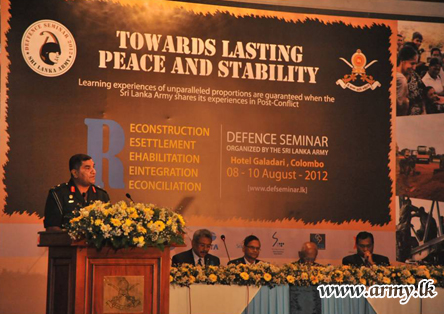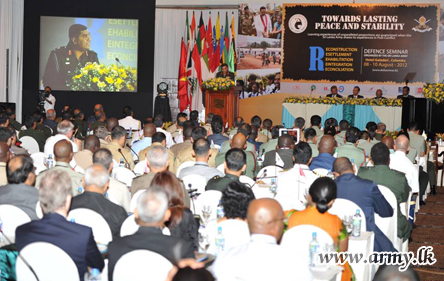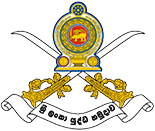Commander of the Army, Lieutenant General Jagath Jayasuriya, extending a warm welcome to the delegates attending the ‘Defence Seminar – 2012’ at Colombo Galadari Hotel underlined that the case in Sri Lanka’s post-conflict situation necessitated the engagement of the Sri Lankan Armed Forces for Civil Community, Civil Ministries, Civil Military Cooperation and in Reconstruction since the three-decade conflict had left the Northern and Eastern Provinces of Sri Lanka in disarray.
“The Government Strategy recognized the need to move on as one nation to achieve a Sri Lankan identity transcending beyond multi ethnic, multi religious and multi cultural diversity to exploit the geo strategic advantage Sri Lanka is endowed with. Reconciliation is the key for a Sri Lankan identity to emerge through the disharmony and distrust that prevailed. The defeat of terrorism in May 2009 and the ensuing devastation both physical and psychological provided the ideal launching pad to seek reconciliation through reconstruction, rehabilitation, resettlement, and reintegration. In short the 5 Rs.
Today three years on Sri Lanka has successfully treaded the path towards national reconciliation”, the Commander added.
“Many countries mainly from the West wanted Sri Lanka to implement and or introduce many measures at a rapid pace surpassing their own in similar circumstances. However Sri Lanka unwavering under the guidance of the Presidential Task Force for Reconstruction and Rehabilitation led by Hon Basil Rajapaksa Minister of Economic Development implemented measures at the optimum pace and was successful in bringing normalcy and resettling all the IDP within a period of 3 years. This proves beyond doubt, the success of our own systems.
These giant strides reflect the commitment of all the stake holders engaged in the process of reconstruction, rehabilitation, resettlement, reintegration and reconciliation. It is unfortunate that all the work done is not conveyed or not known by the international community. We do acknowledge the lack of dissemination of information to the outside world. This deficiency has been exploited by the Diaspora to dilute the progress made and generate anti government propaganda especially violations of human rights by the Military. Very little is known of the military that has gone beyond the call of duty, collecting finances and building homes for their one time adversary”, the Commander told the delegates.
Here follows the full text of his welcome speech;
Historically Armed Forces around the world have been tasked to provide military aid to the civil authority at different times. This process is also known as Civil Military Cooperation or CIMIC. The scope of such assistance is manifold. It encompasses military aid to the Civil Community, military aid to the Civil Ministries and military aid to the Civil Power. The case in Sri Lanka‘s post conflict situation had no difference. The Armed Forces were called in to assist the civil community, the civil ministries and the civil power in post conflict reconstruction and rehabilitation. The engagement of the Armed Forces in Sri Lanka in civil military cooperation was in parallel to the humanitarian operation as opposed to the sequential principle of reconstruction and rehabilitation following warfare and emergency relief.
The three decade long conflict had left the Northern and Eastern Provinces of Sri Lanka in disarray. The infrastructure, Government administrative system, health services, community services, power and energy service, education and housing had been destroyed and disrupted. The social fabric and religious structures, which are critical to social and communal harmony, had been systematically reduced. Approximately 300 000 people were displaced from their dwellings. They had to be fed, clothed and sheltered and subsequently resettled. Over 10 000 combatants surrendered voluntarily. They had to be taken care of, rehabilitated and reintegrated into society. A sense of disharmony and distrust prevailed.
The situation necessitated a well concerted response. The Government responded with a well coordinated strategy integrating Government Ministries & agencies and national & international relief agencies under the leadership of His Excellency Mahinda Rajapaksa the President of the Democratic Socialist Republic of Sri Lanka.
The Government Strategy recognized the need to move on as one nation to achieve a Sri Lankan identity transcending beyond multi ethnic, multi religious and multi cultural diversity to exploit the geo strategic advantage Sri Lanka is endowed with. Reconciliation is the key for a Sri Lankan identity to emerge through the disharmony and distrust that prevailed. The defeat of terrorism in May 2009 and the ensuing devastation both physical and psychological provided the ideal launching pad to seek reconciliation through reconstruction, rehabilitation, resettlement, and reintegration. In short the 5 Rs.
Today three years on Sri Lanka has successfully treaded the path towards national reconciliation.
The infrastructure in the Northern and Eastern Provinces are being developed to contemporary standards. Ninety percent of the displaced have been resettled in their original habitat. Over 10 000 former combatants have been rehabilitated and re-integrated to civil society. The economy in the Northern Province is booming at an annual growth rate of 22%. The recommendations of the Lessons Learnt and Reconciliation Commission appointed by HE Mahinda Rajapaksa the President of Sri Lanka to inquire into the failure of the ceasefire agreement of 22 February 2002 and the sequence of events that followed up to 19 May 2009 are being implemented gradually. Devolution power to the provinces is being negotiated.
Many countries mainly from the West wanted Sri Lanka to implement and or introduce many measures at a rapid pace surpassing their own in similar circumstances. However Sri Lanka unwavering under the guidance of the Presidential Task Force for Reconstruction and Rehabilitation led by Hon Basil Rajapaksa Minister of Economic Development implemented measures at the optimum pace and was successful in bringing normalcy and resettling all the IDP within a period of 3 years. This proves beyond doubt, the success of our own systems.
These giant strides reflect the commitment of all the stake holders engaged in the process of reconstruction, rehabilitation, resettlement, reintegration and reconciliation. It is unfortunate that all the work done is not conveyed or not known by the international community. We do acknowledge the lack of dissemination of information to the outside world. This deficiency has been exploited by the Diaspora to dilute the progress made and generate anti government propaganda especially violations of human rights by the Military. Very little is known of the military that has gone beyond the call of duty, collecting finances and building homes for their one time adversary.
Defence Seminar 2012 on the theme “Towards Lasting Peace and Stability” will showcase the post conflict progress in Sri Lanka in the spheres of Reconstruction, Rehabilitation, Resettlement, Reintegration and Reconciliation. It will provide insights into the ground realities in Sri Lanka and afford the opportunity to assess for oneself the genuine effort at national reconciliation by all concerned and ignite a change in your perceptions of Sri Lanka.
I am particularly pleased to bring together professionals in the respective fields and intellectuals from home and abroad and most importantly some of the stakeholders as resource personnel to discuss the process thus far with a view to sharing the Sri Lankan experience and charting the way forward.
Today as we embark upon Defence Seminar 2012, we are honoured by the presence of Hon Prof GL Peiris Minister of External Affairs, Hon Neomal Perera Deputy Minister of External Affairs,the Secretary to the President Mr Lalith Weeratunga, Secretary Defence and Urban Development Mr Gotabaya Rajapaksa and Secretary External Affairs Mr Karunathilake Amunugama.
I welcome Dr Russell Howard, Prof Arei Kruglansky, Dr Subramanium Swamy, Sir Bill Jeffrey and Mr James Robinson who will share their intellect in their fields of specialization as guest speakers.
I welcome Maj Gen GS Shergill from India, Lt Gen (Retd) Asif Yasin Malik from Pakistan and Maj Gen (Retd) Dr MG Stone from the United States of America who will share their experience in varying post conflict scenarios.
I welcome Maj Gen Ahmed Shyam the Chief of Defence Force Maldives and Brig Gen Dato Seri Yussof the Royal Land Forces Commander Brunei. Your presence is testimony to the strong bonds between our Armed Forces.
Last but not least I welcome each and every delegate to the Defence Seminar 2012 from across the world.
I am confident that Defence Seminar 2012 will provide the platform for professional interaction and enrichment of knowledge leading to the development of new strategies and techniques to overcome post conflict challenges that the world may face in the future.
I wish all of you a rewarding experience and a memorable stay in Sri Lanka.
“The Government Strategy recognized the need to move on as one nation to achieve a Sri Lankan identity transcending beyond multi ethnic, multi religious and multi cultural diversity to exploit the geo strategic advantage Sri Lanka is endowed with. Reconciliation is the key for a Sri Lankan identity to emerge through the disharmony and distrust that prevailed. The defeat of terrorism in May 2009 and the ensuing devastation both physical and psychological provided the ideal launching pad to seek reconciliation through reconstruction, rehabilitation, resettlement, and reintegration. In short the 5 Rs.
Today three years on Sri Lanka has successfully treaded the path towards national reconciliation”, the Commander added.
“Many countries mainly from the West wanted Sri Lanka to implement and or introduce many measures at a rapid pace surpassing their own in similar circumstances. However Sri Lanka unwavering under the guidance of the Presidential Task Force for Reconstruction and Rehabilitation led by Hon Basil Rajapaksa Minister of Economic Development implemented measures at the optimum pace and was successful in bringing normalcy and resettling all the IDP within a period of 3 years. This proves beyond doubt, the success of our own systems.
These giant strides reflect the commitment of all the stake holders engaged in the process of reconstruction, rehabilitation, resettlement, reintegration and reconciliation. It is unfortunate that all the work done is not conveyed or not known by the international community. We do acknowledge the lack of dissemination of information to the outside world. This deficiency has been exploited by the Diaspora to dilute the progress made and generate anti government propaganda especially violations of human rights by the Military. Very little is known of the military that has gone beyond the call of duty, collecting finances and building homes for their one time adversary”, the Commander told the delegates.
Here follows the full text of his welcome speech;
Historically Armed Forces around the world have been tasked to provide military aid to the civil authority at different times. This process is also known as Civil Military Cooperation or CIMIC. The scope of such assistance is manifold. It encompasses military aid to the Civil Community, military aid to the Civil Ministries and military aid to the Civil Power. The case in Sri Lanka‘s post conflict situation had no difference. The Armed Forces were called in to assist the civil community, the civil ministries and the civil power in post conflict reconstruction and rehabilitation. The engagement of the Armed Forces in Sri Lanka in civil military cooperation was in parallel to the humanitarian operation as opposed to the sequential principle of reconstruction and rehabilitation following warfare and emergency relief.
The three decade long conflict had left the Northern and Eastern Provinces of Sri Lanka in disarray. The infrastructure, Government administrative system, health services, community services, power and energy service, education and housing had been destroyed and disrupted. The social fabric and religious structures, which are critical to social and communal harmony, had been systematically reduced. Approximately 300 000 people were displaced from their dwellings. They had to be fed, clothed and sheltered and subsequently resettled. Over 10 000 combatants surrendered voluntarily. They had to be taken care of, rehabilitated and reintegrated into society. A sense of disharmony and distrust prevailed.
The situation necessitated a well concerted response. The Government responded with a well coordinated strategy integrating Government Ministries & agencies and national & international relief agencies under the leadership of His Excellency Mahinda Rajapaksa the President of the Democratic Socialist Republic of Sri Lanka.
The Government Strategy recognized the need to move on as one nation to achieve a Sri Lankan identity transcending beyond multi ethnic, multi religious and multi cultural diversity to exploit the geo strategic advantage Sri Lanka is endowed with. Reconciliation is the key for a Sri Lankan identity to emerge through the disharmony and distrust that prevailed. The defeat of terrorism in May 2009 and the ensuing devastation both physical and psychological provided the ideal launching pad to seek reconciliation through reconstruction, rehabilitation, resettlement, and reintegration. In short the 5 Rs.
Today three years on Sri Lanka has successfully treaded the path towards national reconciliation.
The infrastructure in the Northern and Eastern Provinces are being developed to contemporary standards. Ninety percent of the displaced have been resettled in their original habitat. Over 10 000 former combatants have been rehabilitated and re-integrated to civil society. The economy in the Northern Province is booming at an annual growth rate of 22%. The recommendations of the Lessons Learnt and Reconciliation Commission appointed by HE Mahinda Rajapaksa the President of Sri Lanka to inquire into the failure of the ceasefire agreement of 22 February 2002 and the sequence of events that followed up to 19 May 2009 are being implemented gradually. Devolution power to the provinces is being negotiated.
Many countries mainly from the West wanted Sri Lanka to implement and or introduce many measures at a rapid pace surpassing their own in similar circumstances. However Sri Lanka unwavering under the guidance of the Presidential Task Force for Reconstruction and Rehabilitation led by Hon Basil Rajapaksa Minister of Economic Development implemented measures at the optimum pace and was successful in bringing normalcy and resettling all the IDP within a period of 3 years. This proves beyond doubt, the success of our own systems.
These giant strides reflect the commitment of all the stake holders engaged in the process of reconstruction, rehabilitation, resettlement, reintegration and reconciliation. It is unfortunate that all the work done is not conveyed or not known by the international community. We do acknowledge the lack of dissemination of information to the outside world. This deficiency has been exploited by the Diaspora to dilute the progress made and generate anti government propaganda especially violations of human rights by the Military. Very little is known of the military that has gone beyond the call of duty, collecting finances and building homes for their one time adversary.
Defence Seminar 2012 on the theme “Towards Lasting Peace and Stability” will showcase the post conflict progress in Sri Lanka in the spheres of Reconstruction, Rehabilitation, Resettlement, Reintegration and Reconciliation. It will provide insights into the ground realities in Sri Lanka and afford the opportunity to assess for oneself the genuine effort at national reconciliation by all concerned and ignite a change in your perceptions of Sri Lanka.
I am particularly pleased to bring together professionals in the respective fields and intellectuals from home and abroad and most importantly some of the stakeholders as resource personnel to discuss the process thus far with a view to sharing the Sri Lankan experience and charting the way forward.
Today as we embark upon Defence Seminar 2012, we are honoured by the presence of Hon Prof GL Peiris Minister of External Affairs, Hon Neomal Perera Deputy Minister of External Affairs,the Secretary to the President Mr Lalith Weeratunga, Secretary Defence and Urban Development Mr Gotabaya Rajapaksa and Secretary External Affairs Mr Karunathilake Amunugama.
I welcome Dr Russell Howard, Prof Arei Kruglansky, Dr Subramanium Swamy, Sir Bill Jeffrey and Mr James Robinson who will share their intellect in their fields of specialization as guest speakers.
I welcome Maj Gen GS Shergill from India, Lt Gen (Retd) Asif Yasin Malik from Pakistan and Maj Gen (Retd) Dr MG Stone from the United States of America who will share their experience in varying post conflict scenarios.
I welcome Maj Gen Ahmed Shyam the Chief of Defence Force Maldives and Brig Gen Dato Seri Yussof the Royal Land Forces Commander Brunei. Your presence is testimony to the strong bonds between our Armed Forces.
Last but not least I welcome each and every delegate to the Defence Seminar 2012 from across the world.
I am confident that Defence Seminar 2012 will provide the platform for professional interaction and enrichment of knowledge leading to the development of new strategies and techniques to overcome post conflict challenges that the world may face in the future.
I wish all of you a rewarding experience and a memorable stay in Sri Lanka.
 |
 |
 |

